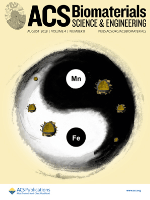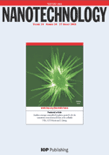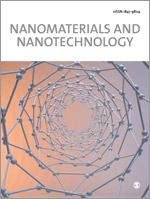
Advances in Nano Research
Scope & Guideline
Catalyzing Advances in Engineering and Materials Science
Introduction
Aims and Scopes
- Nanomaterials and Nanostructures:
Research on the synthesis, characterization, and application of various nanomaterials, such as carbon nanotubes, graphene, and metal nanoparticles, focusing on their unique properties and potential uses in technology and medicine. - Nanomechanical and Vibrational Analysis:
Studies involving the mechanical properties, vibration behavior, and stability of nanostructures and nanocomposites, employing advanced analytical and numerical methods to understand their dynamic responses. - Nanotechnology in Medicine and Healthcare:
Investigations into the use of nanotechnology for medical applications, including drug delivery systems, nanomedicine, and the development of biomaterials that enhance therapeutic outcomes. - Environmental Applications of Nanotechnology:
Research on the role of nanotechnology in environmental remediation, pollution control, and sustainable practices, highlighting the potential of nanomaterials to address ecological challenges. - Educational Integration of Nanotechnology:
Exploration of strategies for integrating nanotechnology concepts into educational curricula, particularly in STEM fields, to enhance learning and engagement among students. - Advanced Computational Techniques:
Application of machine learning, artificial intelligence, and computational modeling in the study and optimization of nanoscale systems and materials, facilitating innovative solutions to complex problems.
Trending and Emerging
- Smart Materials and Structures:
A growing focus on the development and application of smart materials that incorporate nanotechnology for enhanced performance in various engineering applications, including sensors and actuators. - Nanotechnology in Sports Science:
An emerging theme that explores the application of nanomaterials in enhancing sports equipment, performance, and injury prevention, reflecting a multidisciplinary approach to sports science. - Sustainable Nanotechnology:
Research aimed at developing sustainable practices using nanotechnology, particularly in construction and environmental remediation, highlighting the potential of nanomaterials to contribute to sustainability goals. - Machine Learning and Data-Driven Approaches:
An increasing trend towards utilizing machine learning and AI techniques to analyze and predict behaviors in nanoscale systems, which enhances the efficiency and accuracy of research outcomes. - Nanotoxicology and Safety Assessment:
Growing attention on the safety and toxicity of nanomaterials, emphasizing the need for comprehensive studies to understand their environmental and health impacts as nanotechnology becomes more widespread.
Declining or Waning
- Traditional Materials Science:
Research focused on conventional materials science without the integration of nanotechnology has diminished, as the field increasingly emphasizes the unique properties and applications of nanoscale materials. - Basic Theoretical Studies:
Papers that solely discuss theoretical aspects of nanotechnology, without practical applications or experimental validation, have become less frequent, indicating a shift towards more applied research. - Generalized Nanotechnology Applications:
There has been a decrease in publications that broadly discuss nanotechnology applications without specific focus on niche areas like medicine, electronics, or environmental science, reflecting a trend towards more targeted research.
Similar Journals

ACS Biomaterials Science & Engineering
Pioneering Transformative Solutions in Biomedical EngineeringACS Biomaterials Science & Engineering, published by the American Chemical Society, serves as a premier platform for the latest advancements and research in the fields of biomaterials and biomedical engineering. With an impressive impact factor and a strong reputation reflected in its ranking—Q2 in Biomaterials and Q1 in Biomedical Engineering—the journal attracts a diverse and engaged readership. Since its inception in 2015, it has aimed to foster innovation by publishing high-quality research articles, reviews, and perspectives on the synthesis, characterization, and application of biomaterials. Researchers and professionals benefit from the journal's rigorous peer-review process and its focus on translational science, making it essential for those looking to stay at the forefront of biomaterials research. Located in Washington, DC, USA, the journal plays a pivotal role in connecting academic and industrial sectors, ultimately driving advancements that impact biomedicine and related fields.

INDIAN JOURNAL OF CHEMICAL TECHNOLOGY
Bridging Knowledge Gaps in Chemical TechnologyThe Indian Journal of Chemical Technology, published by the Natl Inst Science Communication-NISCAIR, is a pivotal platform for the dissemination of innovative research in the field of chemical technology. With an ISSN of 0971-457X and an E-ISSN of 0975-0991, this journal has been serving the academic community since its inception in 1994, and is set to continue through 2024. The journal holds a Q4 ranking in both the Chemical Engineering and Chemistry categories as of 2023, though it showcases a significant breadth of research, making it a valuable resource for both emerging and established scholars. Although it currently operates without an open-access model, the journal aims to facilitate knowledge exchange through rigorous peer-reviewed publications, allowing researchers and professionals to stay updated with the latest advancements and practices in chemical technology. Located in New Delhi, India, the journal not only contributes to national scientific dialogue but also plays a key role in the global conversation around chemical sciences by addressing unique challenges and innovations pertinent to the region.

NANOTECHNOLOGY
Bridging Disciplines for Tomorrow's Technologies.NANOTECHNOLOGY is a premier academic journal published by IOP Publishing Ltd, focusing on cutting-edge advancements in the interdisciplinary field of nanoscience and nanotechnology. With a strong emphasis on research that bridges biology, chemistry, engineering, and materials science, this journal presents high-quality, peer-reviewed articles that cater to the diverse interests of researchers, professionals, and students alike. NANOTECHNOLOGY boasts an impressive ISSN: 0957-4484 and E-ISSN: 1361-6528, and holds a notable position within Scopus, ranked in the second quartile (Q2) across multiple categories including Bioengineering and Mechanical Engineering, underscoring its vital role in advancing the field. The journal's impact is further highlighted by its robust rankings, making it essential reading for those looking to stay at the forefront of nanotechnology research. Commencing in 1990 and with publication extending through to 2024, NANOTECHNOLOGY provides a unique platform for disseminating significant findings and innovative methodologies while fostering collaborations across various scientific disciplines. In a rapidly evolving technological landscape, this journal not only enhances academic discourse but also contributes to the practical applications of nanotechnology in real-world scenarios.

ADVANCED FUNCTIONAL MATERIALS
Shaping the Future of Materials Through Rigorous ResearchADVANCED FUNCTIONAL MATERIALS is a leading journal published by WILEY-V C H VERLAG GMBH, prominently recognized in the fields of biomaterials, chemistry, condensed matter physics, and materials science. With an impressive impact factor and a distinguished position in the Q1 quartile across multiple categories including nanoscience and nanotechnology, this journal serves as a vital platform for researchers and professionals committed to innovating in functional materials. Since its inception in 2000, ADVANCED FUNCTIONAL MATERIALS has published high-quality peer-reviewed articles that push the boundaries of materials science, exploring new frontiers in electronic, optical, and magnetic materials. The journal's dedication to open access ensures that its groundbreaking findings are readily available to a global audience, fostering collaboration and knowledge-sharing among scholars and practitioners in the field. For those seeking to stay at the forefront of materials research, ADVANCED FUNCTIONAL MATERIALS is an essential resource.

FULLERENES NANOTUBES AND CARBON NANOSTRUCTURES
Connecting Researchers to the Cutting Edge of Carbon ScienceFULLERENES NANOTUBES AND CARBON NANOSTRUCTURES, published by Taylor & Francis Inc, stands at the forefront of research in the fields of nanotechnology, materials science, and organic chemistry. With an ISSN of 1536-383X and an E-ISSN of 1536-4046, this journal offers a critical platform for disseminating significant findings related to carbon-based nanostructures, materials characterization, and their innovative applications. Recognized for its scholarly impact, the journal enjoys a Q2 ranking in several fields, including Atomic and Molecular Physics, Materials Science, and Organic Chemistry, reflecting its commitment to quality research. Since its inception in 2002, it has maintained a rigorous publication standard and provides open access options, enabling a diverse audience, from researchers to industry professionals, to engage with the latest advancements. The journal's comprehensive scope across converged years until 2024 emphasizes its pivotal role in fostering knowledge in the rapidly evolving realm of nanoscience and nanotechnology. Researchers and practitioners alike are encouraged to explore the cutting-edge research showcased in this vital resource.

Journal of Nano Research
Unveiling the Future of NanoscienceThe Journal of Nano Research, published by Trans Tech Publications Ltd, is a distinguished academic journal dedicated to the rapidly evolving field of nanotechnology and materials science. With an ISSN of 1662-5250 and an E-ISSN of 1661-9897, the journal has been an important platform for researchers and professionals since its inception in 2008, continuing to provide high-quality peer-reviewed research through to 2024. Nestled in Switzerland, the Journal of Nano Research plays a pivotal role in disseminating cutting-edge findings, as recognized by its categorization in Q3 for Materials Science and Physics while being positioned in Q4 for Nanoscience and Nanotechnology as of 2023. With Scopus rankings highlighting its impact, including Rank #129 in general Physics and Astronomy and Rank #300 in Materials Science, this journal is crucial for academics seeking to stay ahead in research trends and innovations in nano-related disciplines. Although it operates under a subscription model, the journal's objectives include fostering collaboration and knowledge-sharing among researchers, making it an invaluable resource for anyone immersed in the world of nanotechnology.

IEEE Open Journal of Nanotechnology
Advancing Nanotechnology for a Brighter TomorrowIEEE Open Journal of Nanotechnology is an innovative publication dedicated to advancing the field of nanotechnology, with a particular focus on its applications in areas such as computer science, electrical engineering, and materials science. As an esteemed publication of the IEEE (Institute of Electrical and Electronics Engineers), established since 2020, it follows a robust Open Access model, ensuring that high-quality research is accessible to a global audience without financial barriers. This journal is notable for its diverse scope and has rapidly gained recognition, achieving a commendable Q3 ranking across multiple categories, including Computer Science Applications and Materials Chemistry, according to the latest 2023 assessments. With a Scopus ranking that places it among the top journals in the engineering and materials science domains, the IEEE Open Journal of Nanotechnology is positioned as a critical resource for researchers, professionals, and students interested in the cutting-edge developments and methodologies in nanotechnology. The journal promotes interaction and collaboration among scholars and practitioners, making it a vital platform for sharing novel insights and innovations in this rapidly evolving field.

Nano Research
Championing excellence in nanoscale research.Nano Research, published by TSINGHUA UNIVERSITY PRESS, is a prestigious academic journal dedicated to advancing the fields of nanoscience and nanotechnology. Since its inception in 2009, the journal has established itself as a leading platform for the dissemination of high-quality research, evidenced by its impressive Q1 rankings across multiple categories including Atomic and Molecular Physics, Condensed Matter Physics, and Electrical and Electronic Engineering. With an impact that resonates globally, Nano Research not only attracts contributions from renowned researchers but also appeals to students and professionals striving to stay at the forefront of innovation. The journal’s commitment to excellence is reflected in its ranking, placing it in the top echelons of its field, as evidenced by its notable Scopus standings. Researchers can benefit from its rigorous peer-review process and broad scope, encompassing theoretical, experimental, and applied studies. For those passionate about pushing the boundaries of knowledge in the realm of nanotechnology, Nano Research serves as an indispensable resource.

Nanomaterials and Nanotechnology
Disseminating Insights for Tomorrow's InnovationsNanomaterials and Nanotechnology is a premier journal published by HINDAWI LTD, dedicated to advancing knowledge in the rapidly evolving fields of nanomaterials and nanoscale applications. Established as an Open Access platform since 2011, the journal aims to disseminate high-quality research that provides insights into nanotechnology's manifold aspects, including biotechnology, ceramics and composites, as well as electrical and electronic engineering. With a compelling impact factor reflected in its robust Scopus rankings—placing it in the 80th percentile in Engineering and the 72nd percentile in Biotechnology—it stands as a key resource for researchers, professionals, and students seeking to stay at the forefront of innovation in materials science. The journal occupies a distinguished position in the academic community, featuring studies that explore the synthesis, characterization, and application of nanomaterials, thereby contributing significantly to scientific discourse and technological advancement in this critical area.

Discover Nano
Pioneering Discoveries in the World of NanomaterialsDiscover Nano is a pioneering journal published by SPRINGER, dedicated to the rapidly evolving field of nanoscience and nanotechnology. Established in 2023, this innovative platform provides an open-access forum for researchers, professionals, and students to share and disseminate cutting-edge findings in materials science and condensed matter physics. With its commitment to accessibility, Discover Nano encourages a broad spectrum of contributions, aiming to foster collaboration and stimulate discussion in this dynamic area of study. As a new entry into the academic community, the journal holds great potential for growth, aspiring to increase its visibility and impact in the materials science arena, where it currently ranks in the bottom quartile for both materials science and physics categories. Based in Germany and reaching a global audience, Discover Nano represents a significant opportunity for those looking to shape the future of nanotechnology through impactful research and interdisciplinary dialogue.